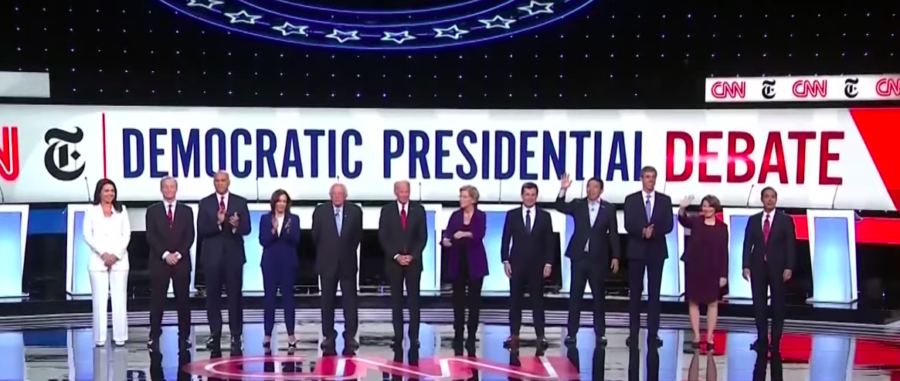Democratic debate features impeachment, health care discussion
The most recent Democratic presidential debate on Oct. 15 featured the largest field of candidates onstage in history. Candidates discussed topics varying from health care to gun control.
October 15, 2019
The fourth Democratic debate late Tuesday featured a record number of candidates, 12 in total, on stage.
The debate began with a question for all candidates regarding the impeachment of President Donald Trump. All candidates on stage have already come out in support of the impeachment inquiry, however many had more to say.
Mayor Pete Buttigieg discussed the importance of impeachment, not only because of Trump’s crimes in office, but because of the poor precedent that would come from not impeaching him. Buttigieg said that not punishing Trump would indicate that the president is above the law.
Alex Klein, junior in history, said he thinks Buttigieg hurt his “moral” position in the race.
“He broke a lot of values that he held, for example when he was punching down at some of the lower-tier candidates,” Klein said. “He called Beto O’Rourke — who’s polling a little below him — he insulted him by saying he didn’t need a lesson of honor, or courage from him.”
Buttigieg, along with Rep. Tulsi Gabbard, was one of two veterans on the debate stage.
Businessman Andrew Yang said the problems that got Trump elected in the first place do not go away with his impeachment.
Health care was the next topic in the debate. The first question was directed to Sen. Elizabeth Warren regarding whether her “Medicare for All” plan would raise taxes on the middle class. Warren said her plan would “lower costs” for the middle and lower class.
Buttigieg criticized Warren for not directly answering the question, and discussed his own plan, “Medicare for All who want it.”
Sen. Amy Klobuchar discussed her own plan for health insurance. Klobuchar’s plan is based off of Obamacare, and unlike the plan from her opponents Sen. Bernie Sanders and Warren, does not eliminate private insurance.
Employment was another topic brought up throughout the night. Sanders was asked about his plan to replace the jobs lost in the manufacturing sector in recent years. One part of his plan is to create new jobs by funding infrastructure work throughout the country.
Yang’s solution to the problem is his plan for Universal Basic Income (UBI). He said “most Americans don’t want to work for the federal government,” and UBI would give money straight to the people.
Sen. Cory Booker said he would raise the minimum wage and strengthen unions around the country in order to help the lower class.
Candidates were asked about solutions to the opioid crisis.
Klobuchar said she would make big pharmaceutical companies pay for treatment and rehabilitation for those addicted to and harmed by their drugs.
Yang said the epidemic is a “disease of capitalism run-amok.” Yang said it is a systemic problem and not to blame on the individuals using the drugs. He also promised to open more safe injection sites around the country.
O’Rourke said he would have marijuana prescribed as a painkiller rather than addictive opioids. He also said we would litigate against pharmaceutical companies and make them pay for the damage they have done to communities.
Sen. Kamala Harris said pharmaceutical companies are “high level dope dealers,” and said she too would chase after pharmaceutical companies in order to pay for the costs of the opioid epidemic.
Some people who watched the debate were not impressed with the policies the candidates espoused.
“I thought there was too much fluff, and I didn’t know the last names of half of the candidates,” said Ted Sink, senior in industrial engineering.
The next debate stage has a higher qualification criteria, and may see some of Tuesday’s candidates cut from the stage.







